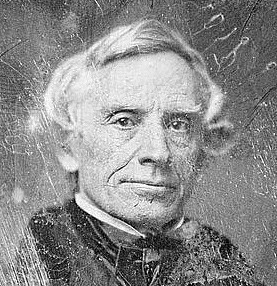May 24: Samuel F.B. Morse Thanks God for What Man Hath Wrought (1844)
 It was on this date, May 24, 1844, that Samuel F.B. Morse sent the message “What hath God wrought,” which inaugurated long-distance coded communication over the first telegraph line strung from Baltimore, Maryland, to his colleague Alfred Vail and an astonished Congress at the Old Supreme Court Chamber in the United States Capitol in Washington, DC. The four words are the coda to a bible verse in Numbers 23:23—“wrought” being the past participle of the verb “to work,” as in “to beat into shape.” “What hath God wrought” seems a peculiar text for a telegraph transmission, but considered in context, the choice of the biblical line is better understood: Samuel Morse (1791-1872) was an organizer and polemicist of the anti-immigrant and anti-Roman Catholic “Nativist” movement of the mid-19th century. Moreover, more than a decade before the American Civil War, Morse came down on the wrong side of history in defending the institution of slavery in the United States as divinely sanctioned.
It was on this date, May 24, 1844, that Samuel F.B. Morse sent the message “What hath God wrought,” which inaugurated long-distance coded communication over the first telegraph line strung from Baltimore, Maryland, to his colleague Alfred Vail and an astonished Congress at the Old Supreme Court Chamber in the United States Capitol in Washington, DC. The four words are the coda to a bible verse in Numbers 23:23—“wrought” being the past participle of the verb “to work,” as in “to beat into shape.” “What hath God wrought” seems a peculiar text for a telegraph transmission, but considered in context, the choice of the biblical line is better understood: Samuel Morse (1791-1872) was an organizer and polemicist of the anti-immigrant and anti-Roman Catholic “Nativist” movement of the mid-19th century. Moreover, more than a decade before the American Civil War, Morse came down on the wrong side of history in defending the institution of slavery in the United States as divinely sanctioned.
But the larger question is: why give credit to God for what man hath wrought? Countless American families sit at the dinner table, prior to the evening meal, and hear one of the breadwinners with folded hands and closed eyes beseech heaven, saying, “Bless this food to our bodies and us to thy service, in Jesus’ name, Amen.” But it was that breadwinner who woke up early each morning, dressed, commuted to a stressful job, spent eight hours slaving for somebody else to earn a meager paycheck, sacrificed time with spouse and children and returned home tired every night so that all may eat and have a roof over their heads and clothes to wear and an education and medical care. But God gets the gratitude?
On the other hand, “what hath God wrought” in allowing millions, not so fortunate as the family described a moment ago, to go without employment, food, clothing, education, health care and family time? Is this how God beats his believers into shape with his blessings? Is it God’s work only judge to his creatures for misuse of their genitals or for mis-marrying or for abortion, but to bless with faint condemnation famine, pestilence, poverty, slavery, racism, genocide and war?
It seems that “What hath God wrought” comes from the same source that propagates bigotry and oppression. Giving credit to God for a work of man may in some circles be a sign of humility, but it is better described as a characteristic of intellectual slavery. It is akin to thanking God when the surgeon, or a well researched and tested drug or vaccine, saves your life, without any measure of help from skygods.
Originally published May 2003 by Ronald Bruce Meyer.

